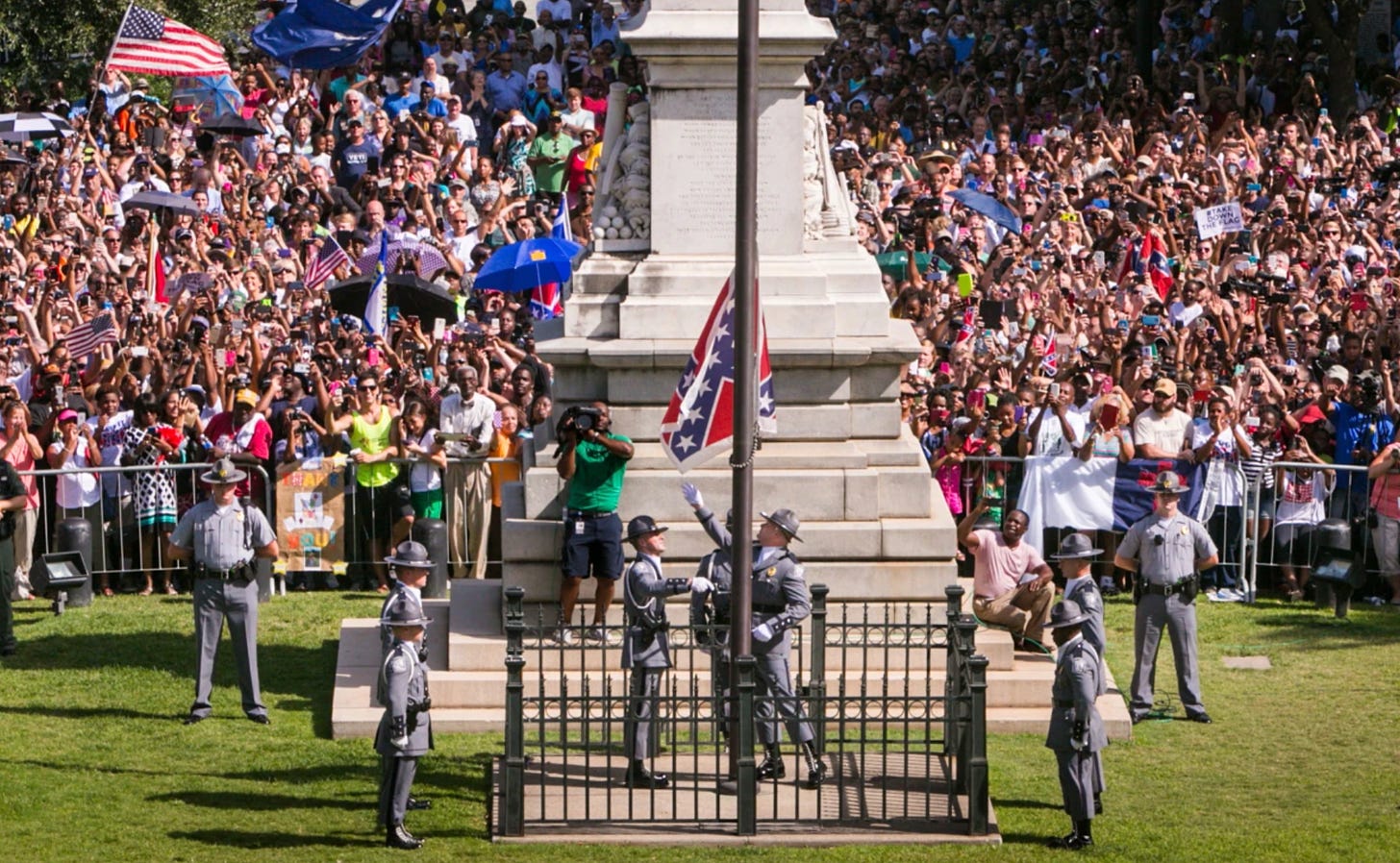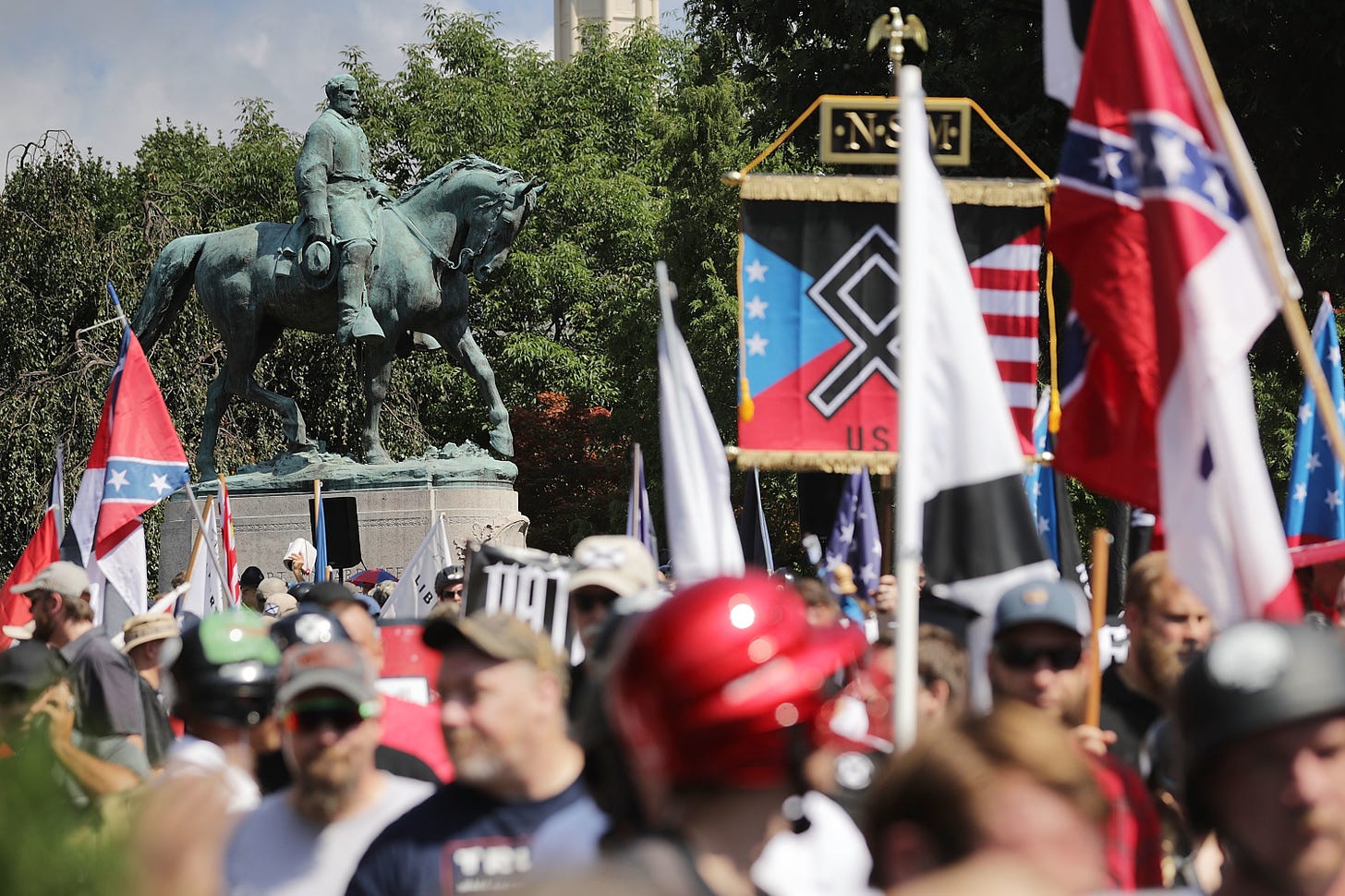Something significant in the landscape of Civil War memory shifted in the wake of the murder of nine churchgoers in Charleston in 2015. At first I thought that the release of photographs of Dylann Roof waving a Confederate flag, along with the initial calls for the removal of flags and Confederate monuments, could be accommodated or explained by an ascendant “emancipationist” narrative.
Now I am not so sure.
During the years of the Civil War 150th (2011-2015) this emancipationist narrative of the war—a term first coined by historian David Blight—highlighted the story of the enslaved, their service in the United States army, along with emancipation and the end of slavery as the war’s most significant result.
The controversies at the time, whether about the commemoration of Confederate heritage month in Virginia and elsewhere, the appearance of Black Confederate soldiers in a 4th grade textbook, or a celebration of secession in 2011 were all about the failure to properly recognize slavery as central to the war.
It all seems pretty quaint looking back on it, but at the time these were pretty intense debates that the media used to remind Americans of a nation that had never been more deeply divided. Some things never change.
A wonderful example of this emancipationist narrative came out in a panel discussion on Civil War legacies that took place at Yale University in 2013, roughly at the midway point of the 150th. The panelists included Andrew Delbanco, Stephanie McCurry, Gary Gallagher, Ta-Nehisi Coates, and John F. Witt. It was moderated by David Blight.
The entire discussion is well worth your time, but for now I want to point out one part early on in which the panelists were asked to reflect on what they take to be the war’s most important legacy. Stephanie McCurry begins by drawing a distinction between the war’s most important “historical legacy” as opposed to its most important “living legacy.”
At its root, according to McCurry, the war was a “crisis of legitimacy” that was an attempt to answer a question that could not be decided legislatively, namely whether the institution of slavery could be contained.
The most important historical legacy was Confederate defeat and the freeing of roughly 4 million people from bondage. She states this with full understanding of the racial violence and disappointment that soon followed. “After their failure in proslavery nationalism.” “After they were beaten,” according to McCurry, “slavery could never be reinstated or rehabilitated as an institution in American life.”
This stands in sharp contrast with what McCurry identifies as the most important living legacy, which, as you might assume, is the continued appeal of the Confederacy and its Lost Cause.
McCurry is certainly correct on both counts, though I would also suggest that the preservation of the Union itself must also be included in any summary of the war’s legacy.
Even if we grant the Lost Cause’s continued pull, during the Civil War 150th it was the legacy of emancipation that dominated National Park Service and state sponsored events/commemorations. The NPS framed its sesquicentennial events around a narrative of: “From Civil War to Civil Rights.”
In many ways the memory of slavery and emancipation overshadowed the Lost Cause, even in cities like the former Confederate capital of Richmond, Virginia. In 2015 the city celebrated emancipation with a reenactment of the entry of United States Colored Troops, who were greeted as liberators in 1865 by its enslaved population.
Increasingly, however, we seem to have moved beyond an emancipationist narrative of the war, even going so far as rejecting it as naive or parochial as a broad assessment of the American past. Black Lives Matter came to fill an important void in the discussion of race in American life. Activists risked and even sacrificed their lives to stand up against white nationalists in places like Charlottesville, Virginia in August 2017. Their agenda, however, has little to do with embracing any specific memory of the Civil War, even though in the case of Charlottesville, the catalyst for the violence that day was the city’s decsion to remove a monument honoring Confederate general Robert E. Lee.
Much of the Civil War 150th was a celebration of emancipation and the end of slavery. Many people understood it also as a triumph over the Lost Cause, but the debate surrounding the removal of monuments, at times, has come across not so much as an extension of the legacy of emancipation and a rejection of the Lost Cause but as a rejection of any notion of change over time.
Confederate monuments have come to be seen more as symbols of continued racial oppression (and one could argue rightly so) rather than as artifacts of a remote past and a painful reminder for many of second-class status.
More and more we hear from historians, commentators, and activists that the Civil War never really ended. A steady stream of op-eds, essays, podcasts, and books argue that Americans are hopelessly mired in a long civil war or barreling toward another one.
I worry that this emphasis on a never-ending war obscures the importance that roughly 4 million former slaves attached to the end of slavery. They certainly understood that something significant had changed and we should too, even as we acknowledge that freedom proved to be fraught with violence and other limitations that would take generations to overcome.
I greatly appreciated this aspect of the sesquicentennial, especially during the commmemoration of events post-1863. Arguably the best example of this was the comemmoration of Lee’s surrender at Appomattox, which explored the lives of the community’s enslaved population and how they both welcomed and experienced freedom.
This brings me to the title of this post. It does seem to me that something significant has changed in our collective memory of the Civil War since 2015 that I don’t think can easily be captured with our current lexicon of Civil War memory.
What do you think?
Have we, to some extent, moved beyond an emancipationist memory of the war? If so, what should we call this new phase? Perhaps, “post-emancipationist”?






Excellent article and worthy of more discussion. The preservation of the Union was necessary for Emancipation, and to bring forth the continuing quest to secure civil rights for all. It is our perseverance in the pursuit of that sacred ideal of the Declaration that Lincoln expounded on in the Gettysburg Address, “Four score and seven years ago our fathers brought forth on this continent, a new nation, conceived in Liberty, and dedicated to the proposition that all men are created equal…” post emancipation but pre-equality for all might be where we are, or living in the uncomfortable middle between the to, as Dietrich Bonhoeffer once wrote about the time between creation and consummation. The Unitarian Pastor and abolitionist, Theodore Parker, prefigured Lincoln in a transcendent ideal of liberty. He wrote, “The American Revolution, with American history since, is an attempt to prove by experience this transcendental proposition, to organize the transcendental idea of politics. The ideal demands for its organization a democracy – a government of all, for all, and by all…”
Anyway, a great discussion topic when a significant minority is attempting to reverse history, roll back civil rights, and rend the Union asunder.
I watched the video. I was particularly intrigued by the reference to black re-enactors. I wonder if the level of interest described by the panel is still the case?
I think McCurry is right in her identification of the historical legacy of the Civil War. I am not so sure she is right about her identification of a living legacy. I also think Gallagher is right about his assessment of the historical legacy of the Civil War. I also think Coats is correct. I think all three are saying that the outcome of the Civil War impacted the United States and the world in very specific ways and if that out come had been different the impacts would have been different. That sounds a little weak I guess but I am not sure what else you can really say.
The comments that I found the most interesting were by the social citric guy ( whose name I don't remember) about the search for a middle ground in the years before the Civil War and the election of 1860 and mcCurry's criticism of that view.
There were people searching for a middle ground that would preserve the country. Lincoln was searching. What shaped that search was a set of beliefs and life ways that were different from ours. What they saw as the middle ground, the containment of slavery, we see as unacceptable. But to understand them and the decisions they made we have to understand these differences. That doesn't mean from our perspective we say the containment of slavery was more desirable than abolition of slavery. But we do acknowledge that stopping the spread was a first societal step towards abolition and by the end of the war we had clearly moved to abolition.
So does that mean we need a new language to talk about the Civil War? I think probably so. I'm not sure how we get that but it does seem to me the narrative has moved on from the "Emancipationist."
Acknowledging the "Emancipationist" view and all it entails was important. But I am not sure where we are headed. The removal of symbols memorializing the Confederacy is important and probably emblematic of the next step. but I have no idea what you call it.